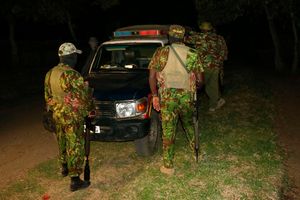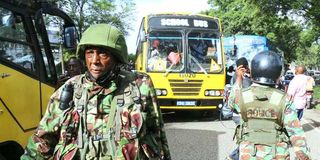
Anti-riot police escort Butere Girls school bus which was ferrying students along 58 road in Nakuru after they declined to perform their play at Melvine Jones academy on April 10, 2025.
That “Echoes of War”, a play lampooning an imaginary rogue regime staged by Butere Girls School, First Lady Rachel Ruto’s alma mater, was bound to upset the government came as no surprise.
Even worse for the Kenya Kwanza administration was the possibility—and embarrassment—of President William Ruto watching the play, which mirrors issues of governance and leadership in Kenya, were it to make the cut for the State House gala. That reality still looms large.
This realisation set off a chain reaction—from attempts to ban the play to the arrest of its author, former Kakamega Senator Cleophas Malala, on Wednesday night.
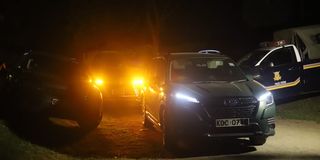
Police vehicles block Cleopas Malala's car at Kirobon Girls High School in Nakuru in an attempt to arrest him on April 9, 2025.
State mandarins say the play, written by a senior member of the opposition and former secretary-general of the ruling UDA party, is a brazen attempt to cast the President in a bad light.
To them, it was inconceivable that Ms Ruto’s alma mater would be at the centre of a play “designed to embarrass her husband, the President”. They can’t take it and have vowed to do anything to stop it.
Last evening, Butere Girls Alumni Association chairperson Selpher Cheloti defended Ms Ruto, saying she had played no role in the matter.
“The alumni association under our Patron, First Lady of The Republic of Kenya, Her Excellency Rachel Ruto, has not in any way influenced the performance or non-performance of the school in drama festivals,” Dr Cheloti said in a statement.
She went on: “As an association, we condemn in the strongest terms possible the negative publicity against our alma mater, the exposure of innocent students of Butere Girls to the traumatising situation surrounding the play, and the use of our patron’s name in the whole saga.”
Criticism came in swift and furious at how paranoid and thin-skinned the government’s security apparatus has become.

Journalists barred from entering Melvin Jones Hall to cover the Butere Girls' performance of their controversial play 'Echoes of War'.
It took a court order to facilitate the staging of the play at the national competition, but even the legal backing wasn’t strong enough to push back the hand of the State. And this forced Chief Justice Martha Koome to weigh in.
“What transpired today raises grave concerns about the extent to which those orders of the High Court were respected and complied with. Defiance of court orders not only undermines the authority of the courts but also poses a serious threat to the rule of law, which is the bedrock of our society,” she said.
The CJ said that even more troubling are reports of the use of force and violence against school going children.
“I wish to make it clear to all state organs, state officers and public officers that respect for court orders is not optional. It is a constitutional imperative that safeguards our collective commitment to the rule of law, and constitutionalism. Any deviation from this path erodes public confidence in our institutions and poses a danger to our democracy,” the CJ said.
The staging of the play was thrown into turmoil yesterday when the cast, protesting the arrest of their scriptwriter and the manner in which they were handled, refused to perform.
This was the second time in over a decade that Butere Girls was locking horns with the government after its other play—Shackles of Doom—also scripted by Mr Malala, was frustrated in 2013 when President Uhuru Kenyatta was in power with Dr Ruto as Deputy President.
(Here is the full script as produced in court -- Go to page 11.
The girls’ attempt to perform the play at the Kenya National Schools and Colleges Drama and Film Festival in Nakuru was met with an aggressive anti-riot police response that shocked the audience and ignited public fury.
The brutal crackdown began on Wednesday night with the arrest of Mr Malala who was detained at Eldama Ravine police station in Baringo, but was later released unconditionally.
Journalists covering the arrest had tear gas lobbed at them and others were assaulted by police allegedly enforcing an order to expel them from Kirobon Girls High School where the students had been staying.
The parallels between the fictional kingdom depicted in the play and Kenya’s own political situation became undeniable when the staging was interrupted by the police.
Journalists, the public barred from venue
On Thursday, journalists, students and the public were barred from accessing Melvine Jones Academy hall in Nakuru City where the students were to stage the play. Unlike on other days when entry was free for all, armed police officers manning the main gate ordered those interested in watching the play to leave and stand outside.
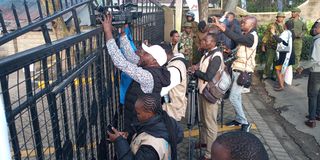
Journalists barred from entering Melvin Jones Hall to cover the Butere Girls' performance of their controversial play 'Echoes of War'.
A contingent of anti-riot officers had been deployed to man the gate, others to patrol the venue and some to inspect vehicles before entry.
At 7.20am, the Butere Girls performers arrived and were met with cheers from the public and fellow students who had eagerly been waiting to watch the play.
The students were forced to change into their costumes inside the bus by the police before being escorted to the main hall under tight security. A lorry carrying their props was denied entry into the venue.

Police guard the bus that took the Butere Girls to the Melvin Jones Academy minutes before they were due to perform their play Echos of War in an auditorium with no audience.
Once inside, the girls sang the national anthem in a powerful act of defiance and then walked off stage. As they returned to their bus, police hurled tear gas at them. This triggered public outcry as Kenyans rallied behind the performers’ stand for justice and free expression.
“We are just implementing orders. We have been instructed not to allow the media and the public to access the venue to watch or record the play. We have no choice but to chase you guys away,” said one officer.
Speaking after his release, Mr Malala condemned the police action and accused President Ruto’s government of trying to stifle free expression and suppress youth activism through the arts.
“I’m encouraged by the heroism of the Butere Girls students. I’m determined to ensure that ‘Echoes of War’ is displayed before a national audience. Whatever action is taken, we are determined to go back to court to ensure we get orders for it to be staged before the festivals end,” Mr Malala said.

Former Kakamega Senator and the scriptwriter of the play, 'Echoes of War', Cleopas Malala, accompanied by DAPK party leader Eugene Wamalwa and his lawyer Ken Echesa, arrive at Waterbuck Hotel in Nakuru City on April 10, 2025, after he was released by police from Eldama Ravine Police Station.
The play is set in a fictitious Middle Eastern kingdom where the conflict is between the older generation and the youth, who are agitated by the inflexible strictness of the old guard. The kingdom is ruled by a tyrannical sultan who is irked by the activism of the young.
The protagonist, Mustafa, a young university student, develops telemedicine technology that riles the government. His girlfriend, Anifa Imana, plays a crucial role in defending him when he is arrested.
The play, a sharp critique of authoritarian rule, has been seen by many as a mirror of the struggles faced by Kenyan youth who last year held countrywide anti-tax demonstrations.
A Kenya National Commission on Human Rights dossier put the number of those dead in the June 2024 protests at 60, a figure which Inspector-General of Police Douglas Kanja disputed and said it was 40.
Court order
Last week, the play was dropped from the Western Region winners’ gala, and the drama club directed to send the students home, effectively halting preparations for the national fete. This was despite winning at the Butere sub-county level and securing third place in the regional festivals.
But on April 3, the High Court directed the school’s principal to recall the students to take part in the festival in Nakuru.
Thursday's incident sparked fierce debates across the country, with critics arguing that the play’s interruption and the police’s heavy-handed response are emblematic of a government desperate to silence dissent.
ODM Secretary-General Edwin Sifuna faulted the government for harassing the students, warning that such actions pose a threat to freedom of expression.
“Of all the evidence we already have of the lack of focus of this regime, it has shot itself in the foot by harassing and attempting to dim the voices of young girls in school uniform. The freedom of expression guaranteed by our constitution allows people of all ages to express themselves freely, even if we do not particularly like what they have to say,” Mr Sifuna said in a statement.
Former Chief Justice David Maraga said the Constitution guarantees every person the right to freedom of expression, including artistic creativity.
“No child should be punished or endangered for thinking critically, speaking boldly, or performing creatively. Silencing students through force and fear is a direct assault on their constitutional rights. Let us not raise a generation that fears its own voice, especially when they are protected by Constitutional guarantees. Let us protect, nurture, and celebrate the courage of our young people—their voices matter,” Mr Maraga said.
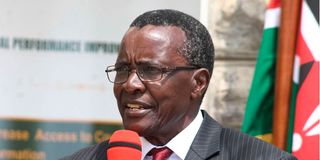
Retired Chief Justice David Maraga.
International Commission of Jurists Kenya chairperson Protas Saende condemned the police action describing it as “an act of censorship and an attack on the voices of the youth”.
“We commend the High Court’s intervention on April 9, 2025, which rightly affirmed the students’ constitutional rights and ordered their inclusion in the national competition. This judicial directive served as a crucial reminder that the rule of law must prevail over administrative overreach,” he said.
On Monday, Basic Education Secretary Julius Bitok had admitted that there were some issues around the play but was quick to note that they have been resolved and the play would be staged.
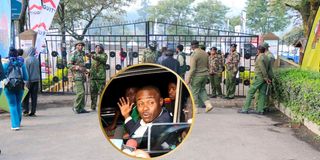
Police officers block the entrance of Melvin Jones Hall where Butere Girls' were set to perform their play 'Echoes of War'. (Inset) Playwright Cleophas Malala outside outside Kirobon Girls High School on April 9, 2025.
Interior Cabinet Secretary Kipchumba Murkomen questioned how a politician was allowed to write the play for the students.
“Let’s have a thick line between politics and education. Let’s spare our innocent school kids in this. Let’s not allow political competition to come into play in the education arena. I assure parents and the nation that we will not allow interference with education,” he said.
Also Read: 'Echoes of War' Live Blog: CS Murkomen says plays with adult themes should go to national theatres
The CS also apologised to journalists and students who were handled with excessive force by the police.
“It is regrettable and I apologise. It’s not the intention of government to attack or hurt any journalist or citizen. We are going to investigate and establish if the incident was accidental or intentional and take action,” said Mr Murkomen.


